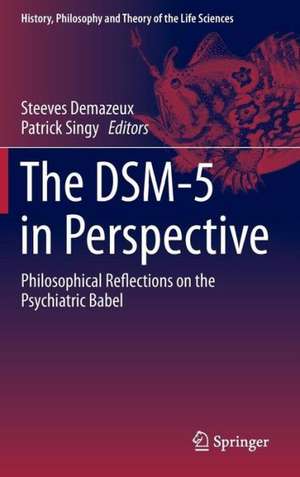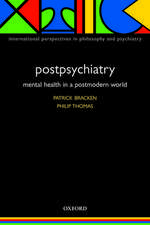The DSM-5 in Perspective: Philosophical Reflections on the Psychiatric Babel: History, Philosophy and Theory of the Life Sciences, cartea 10
Editat de Steeves Demazeux, Patrick Singyen Limba Engleză Hardback – 23 mar 2015
For several decades the DSM has been nicknamed “The Psychiatric Bible.” This volume would like to suggest another biblical metaphor: the Tower of Babel. Altogether, the essays in this volume describe the DSM as an imperfect and unachievable monument – a monument that was originally built to celebrate the new unity of clinical psychiatric discourse, but that ended up creating, as a result of its hubris, ever more profound practical divisions and theoretical difficulties.
| Toate formatele și edițiile | Preț | Express |
|---|---|---|
| Paperback (1) | 779.57 lei 6-8 săpt. | |
| SPRINGER NETHERLANDS – 29 oct 2016 | 779.57 lei 6-8 săpt. | |
| Hardback (1) | 785.55 lei 6-8 săpt. | |
| SPRINGER NETHERLANDS – 23 mar 2015 | 785.55 lei 6-8 săpt. |
Din seria History, Philosophy and Theory of the Life Sciences
- 15%
 Preț: 642.83 lei
Preț: 642.83 lei - 18%
 Preț: 735.84 lei
Preț: 735.84 lei - 15%
 Preț: 644.95 lei
Preț: 644.95 lei -
 Preț: 349.62 lei
Preț: 349.62 lei - 18%
 Preț: 1246.15 lei
Preț: 1246.15 lei -
 Preț: 398.63 lei
Preț: 398.63 lei - 15%
 Preț: 701.06 lei
Preț: 701.06 lei -
 Preț: 389.11 lei
Preț: 389.11 lei - 15%
 Preț: 651.02 lei
Preț: 651.02 lei -
 Preț: 391.22 lei
Preț: 391.22 lei - 15%
 Preț: 646.43 lei
Preț: 646.43 lei - 24%
 Preț: 590.17 lei
Preț: 590.17 lei - 15%
 Preț: 644.49 lei
Preț: 644.49 lei - 18%
 Preț: 1120.05 lei
Preț: 1120.05 lei - 15%
 Preț: 583.78 lei
Preț: 583.78 lei - 5%
 Preț: 1103.39 lei
Preț: 1103.39 lei -
 Preț: 438.69 lei
Preț: 438.69 lei - 15%
 Preț: 693.57 lei
Preț: 693.57 lei - 15%
 Preț: 638.57 lei
Preț: 638.57 lei - 5%
 Preț: 906.63 lei
Preț: 906.63 lei - 15%
 Preț: 692.09 lei
Preț: 692.09 lei -
 Preț: 353.99 lei
Preț: 353.99 lei - 18%
 Preț: 949.23 lei
Preț: 949.23 lei - 18%
 Preț: 735.21 lei
Preț: 735.21 lei - 18%
 Preț: 725.75 lei
Preț: 725.75 lei - 18%
 Preț: 792.19 lei
Preț: 792.19 lei -
 Preț: 357.63 lei
Preț: 357.63 lei - 24%
 Preț: 713.95 lei
Preț: 713.95 lei -
 Preț: 354.38 lei
Preț: 354.38 lei - 18%
 Preț: 735.38 lei
Preț: 735.38 lei
Preț: 785.55 lei
Preț vechi: 957.99 lei
-18% Nou
Puncte Express: 1178
Preț estimativ în valută:
150.32€ • 157.34$ • 125.11£
150.32€ • 157.34$ • 125.11£
Carte tipărită la comandă
Livrare economică 31 martie-14 aprilie
Preluare comenzi: 021 569.72.76
Specificații
ISBN-13: 9789401797641
ISBN-10: 9401797641
Pagini: 264
Ilustrații: XXIV, 238 p.
Dimensiuni: 155 x 235 x 20 mm
Greutate: 0.54 kg
Ediția:2015
Editura: SPRINGER NETHERLANDS
Colecția Springer
Seria History, Philosophy and Theory of the Life Sciences
Locul publicării:Dordrecht, Netherlands
ISBN-10: 9401797641
Pagini: 264
Ilustrații: XXIV, 238 p.
Dimensiuni: 155 x 235 x 20 mm
Greutate: 0.54 kg
Ediția:2015
Editura: SPRINGER NETHERLANDS
Colecția Springer
Seria History, Philosophy and Theory of the Life Sciences
Locul publicării:Dordrecht, Netherlands
Public țintă
ResearchCuprins
Introduction; Steeves Demazeux and Patrick Singy.- Part I. General issues.- Chapter 1. The Ideal of Scientific Progress and the DSM; Steeves Demazeux.- Chapter 2. DSM-5 and Research Concerning Mental Illness; Jeffrey Poland.- Chapter 3. DSM-5 and Psychiatry’s Second Revolution: Descriptive vs. Theoretical Approaches to Psychiatric Classification; Jonathan Tsou.- Chapter 4. DSM-5: The Delayed Demise of Descriptive Diagnosis; Stuart A. Kirk, David Cohen, Tomi Gomory.- Chapter 5. Must Disorders Cause Harm? The Changing Stance of the DSM; Rachel Cooper.- Chapter 6.‘Deviant Deviance’: Cultural Diversity in DSM-5; Dominic Murphy.- Part II. Specific issues.- Chapter 7. Danger and Difference: The Stakes of Hebephilia; Patrick Singy.- Chapter 8. Sexual Dysfunctions and Asexuality in DSM-5; Andrew Hinderliter.- Chapter 9. The Crippling Legacy of Monomanias in DSM-5; John Z. Sadler.- Chapter 10. The Loss of Grief: Science and Pseudoscience in the Debate Over DSM-5’s Elimination of the Bereavement Exclusion; Jerome Wakefield.- Chapter 11. Against Hyponarrating Grief: Incompatible Research and Treatment Interests in the DSM-5; Şerife Tekin.- Chapter 12. RDoC: Thinking Outside the DSM Box without Falling into a Reductionist Trap; Luc Faucher and Simon Goyer.- Chapter 13. DSM-5 and the Reconceptualization of Obsessive-Compulsive Disorder: An Anthropological Perspective from the Neuroscience Laboratory; Baptiste Moutaud.
Recenzii
“The essays in Demazeux’s and Singy’s volume are all about the DSM-5, but they also address many distinct aspects of human life, from research design to moral values, to sexuality, to grief. … the volume–and the intensity of the criticisms it contains–eloquently demonstrates the importance of the DSM to modern life. This in turn proves the importance of the collection, which contributes to our understanding of both the DSM and ourselves.” (Brent M. Kious, Metascience, Vol. 25, 2016)
“The present volume of philosophical commentary on this ambitious project offers a range of contributions to the debate about psychiatric nosology, a few of which are truly outstanding. … this volume is recommended reading for specialists and non-specialists alike interested in the problems inherent in constructing any useful taxonomy of mental conditions and particularly for insight into the science, history, and politics that have shaped the current DSM-5.” (Mark J. Sedler, Notre Dame Philosophical Reviews, ndpr.nd.edu, August, 2015)
“This is a collection of essays from different authors exploring the main problems of the DSM-5. … The purpose is to review and discuss the methodological and philosophical weaknesses, as well cultural bias, in the DSM-5. … one definitely worth checking out if you deal with the DSM at all.” (Brett C. Plyler, Doody's Book Reviews, July, 2015)
“The present volume of philosophical commentary on this ambitious project offers a range of contributions to the debate about psychiatric nosology, a few of which are truly outstanding. … this volume is recommended reading for specialists and non-specialists alike interested in the problems inherent in constructing any useful taxonomy of mental conditions and particularly for insight into the science, history, and politics that have shaped the current DSM-5.” (Mark J. Sedler, Notre Dame Philosophical Reviews, ndpr.nd.edu, August, 2015)
“This is a collection of essays from different authors exploring the main problems of the DSM-5. … The purpose is to review and discuss the methodological and philosophical weaknesses, as well cultural bias, in the DSM-5. … one definitely worth checking out if you deal with the DSM at all.” (Brett C. Plyler, Doody's Book Reviews, July, 2015)
Textul de pe ultima copertă
Since its third edition in 1980, the Diagnostic and Statistical Manual of Mental Disorders (DSM) of the American Psychiatric Association has acquired a hegemonic role in the health care professions and has had a broad impact on the lay public. The publication in May 2013 of its fifth edition, the DSM-5, marked the latest milestone in the history of the DSM and of American psychiatry. In The DSM-5 in Perspective: Philosophical Reflections on the Psychiatric Babel, experts in the philosophy of psychiatry propose original essays that explore the main issues related to the DSM-5, such as the still weak validity and reliability of the classification, the scientific status of its revision process, the several cultural, gender, and sexist biases that are apparent in the criteria, the comorbidity issue, and the categorical vs. dimensional debate.
For several decades the DSM has been nicknamed “The Psychiatric Bible.” This volume would like to suggest another biblical metaphor: the Tower of Babel. Altogether, the essays in this volume describe the DSM as an imperfect and unachievable monument – a monument that was originally built to celebrate the new unity of clinical psychiatric discourse, but that ended up creating, as a result of its hubris, ever more profound practical divisions and theoretical difficulties.
For several decades the DSM has been nicknamed “The Psychiatric Bible.” This volume would like to suggest another biblical metaphor: the Tower of Babel. Altogether, the essays in this volume describe the DSM as an imperfect and unachievable monument – a monument that was originally built to celebrate the new unity of clinical psychiatric discourse, but that ended up creating, as a result of its hubris, ever more profound practical divisions and theoretical difficulties.
Caracteristici
First book-long appraisal of the DSM-5 Comprehensive picture of controversies over the construction of the DSM-5 State-of-the-art philosophical criticism on the current classification of mental disorders











